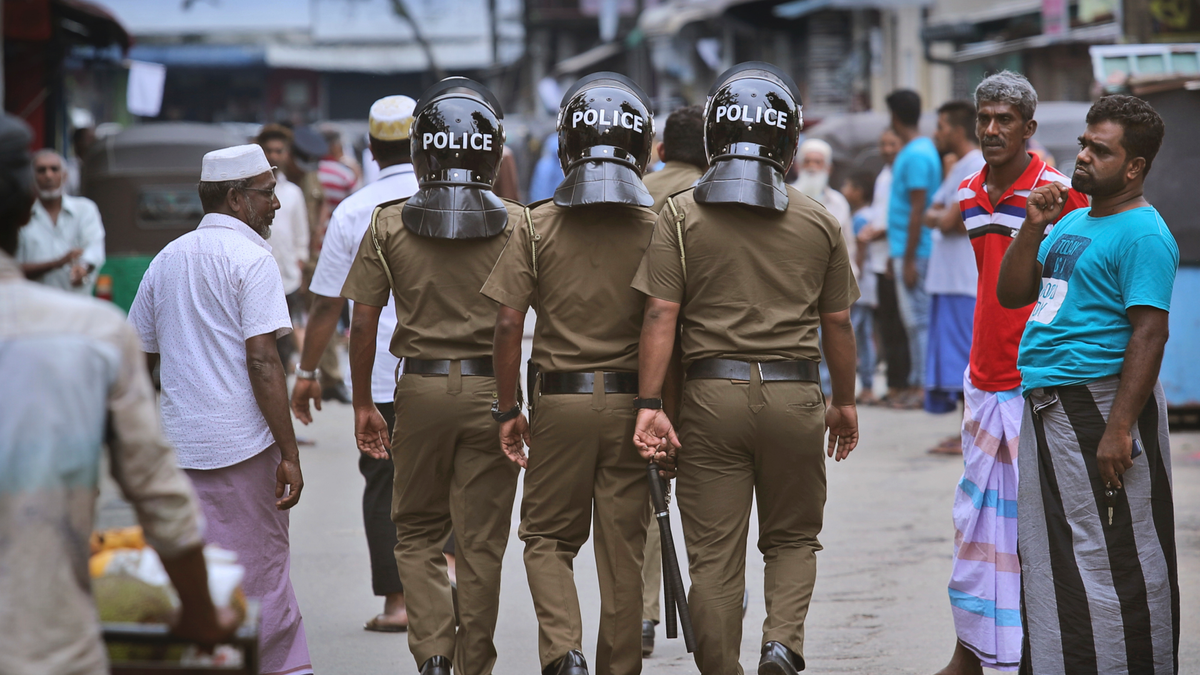Fox News Flash top headlines for April 28
Fox News Flash top headlines for April 28 are here. Check out what's clicking on Foxnews.com
With churches in Sri Lanka closed a week after suicide bombings killed more than 250 people on Easter, Catholics in the island nation celebrated Mass in their homes Sunday via a televised broadcast on Sunday.
Sajith Liyanage, a 51-year-old Catholic said he was still worried about the possibility of attacks and would be watching the Mass on TV.
“We can’t understand what the situation is right now,” Liyanage told The Associated Press.
EAST SRI LANKA ON EDGE AFTER EASTER BOMBERS LINKED TO REGION
Cardinal Malcolm Ranjith, the archbishop of Colombo, delivered a homily before his clergy and country's leaders in a small chapel.
“This is a time our hearts are tested by the great destruction that took place last Sunday,” Ranjith said. “This is a time questions such as, does God truly love us, does he have compassion toward us, can arise in human hearts.”
The Colombo mass was attended by President Maithripala Sirisena, Prime Minister Ranil Wickremesinghe and opposition leader Mahinda Rajapaksa in a show of unity after their political rivalry was blamed for the failure to act on foreign intelligence reports that suggested an attack could take place.

A Sri Lankan police commando secures the area of exploded St. Anthony's Church on Easter Sunday attacks in Colombo, Sri Lanka, Sunday, April 28, 2019. Sri Lanka's Catholics on Sunday awoke to celebrate Mass in their homes by a televised broadcast as churches across the island nation shut over fears of militant attacks, a week after the Islamic State-claimed Easter suicide bombings. ((AP Photo/Eranga Jayawardena))
Later in the day, Sirisena banned all kinds of face coverings that may conceal people's identities. The emergency law, which takes effect Monday, prevents Muslim women from veiling their faces.
The decision came after the Cabinet had proposed laws on face veils at a recent meeting. It had deferred the matter until talks with Islamic clerics could be held, on the advice of Wickremesinghe.
At the same time, police entered the main mosque of National Towheed Jamaat on Sunday afternoon, just a day after authorities declared it and another organization terror groups over the bombings. A senior police officer dispersed journalists waiting outside, saying authorities were conducting a "cordon and search operation." Officers locked up the mosque just before afternoon prayers were set to begin.
Authorities banned National Towheed Jamaat on Saturday over its ties to Mohammed Zahran, the alleged mastermind of the attacks that killed over 250 people a week ago. Zahran and masked others had pledged their loyalty to ISIS leader Abu Bakr al-Baghdadi before carrying out the attacks, showing the danger the extremist group poses even after losing all its territory in Iraq and Syria.
PRAYERS FOR BANGLADESHI BOY KILLED IN SRI LANKA ATTACK

Sri Lankan policeman patrol in a Muslim neighborhood before Friday prayers in Colombo, Sri Lanka, Friday, April 26, 2019. (AP Photo/Manish Swarup)
In all, police said they had arrested 48 suspects over the last 24 hours as checkpoints mounted by all of Sri Lanka's security forces sprung up across this country of 21 million people. Those arrested include two men whom authorities recently appealed to the public to locate.
On Friday night, a confrontation with police sparked a firefight with the militants in Kalmunai, some 140 miles northeast of Colombo. Sri Lanka's military said the gunfire and later suicide blasts killed 15 people, including six children.
On Sunday, the Islamic State group claimed three of the militants who blew themselves up there. In a statement carried by the extremists' Aamaq propaganda arm, ISIS identified the bombers by their aliases: Abu Hammad, Abu Sufyan and Abu al-Qa'qa. It said they opened fire with automatic weapons and "after exhausting their ammunition, detonated ... their explosive belts."
Police spokesman Ruwan Gunasekara said a woman and a 4-year-old child found wounded after the gunbattle have been identified as Zahran's wife and daughter.
At the main police station in Ampara, an outdoor stage now holds what police recovered after the firefight. The ISIS-aligned militants had created a bomb-making factory at the home, complete with laboratory-style beakers and thick rubber gloves.
Bags of fertilizer, gunpowder and small ball bearings filled boxes. Police found gallons of acids, used to make the fire of the blast more lethal.
An investigator told The Associated Press that the bombs contained a mixture of fertilizer, gunpowder, ball bearings and explosives typically used by quarries to blast loose rocks, the investigator said. Those explosives made the bombs powerful enough to blow the roof off of St. Sebastian's Church in Negombo, he said, referring to one of the churches near Colombo targeted in the Easter attacks.
The Sri Lankan navy controls the sale of the mining explosives and investigators already have begun tracing the serial numbers off of the plastic sticks, he said. A notebook contained bomb-making instructions that had apparently been explained to the writer.
CLICK HERE TO GET THE FOX NEWS APP
Police also recovered religious tracts in Tamil glorifying suicide bombings, saying they granted the attacker direct entrance to heaven. The investigator contrasted that to the Tamil Tigers, a separatist group the government defeated in 2009 after a 26-year civil war.
"Their only intention is to kill as many as possible," the investigator said. "That is different than the Tamil Tigers. They wanted to control land. These people want to kill as many as possible."
The Associated Press contributed to this report.





















